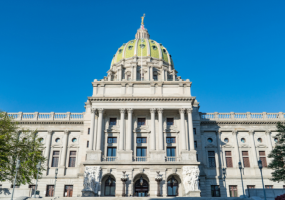 Last week, House lawmakers passed Gov. Shapiro’s transportation funding plan and advanced two harmful proposals related to tax policy and environmental marketing claims. Meanwhile, budget negotiations appear to remain gridlocked with only days remaining before the June 30 deadline.
Last week, House lawmakers passed Gov. Shapiro’s transportation funding plan and advanced two harmful proposals related to tax policy and environmental marketing claims. Meanwhile, budget negotiations appear to remain gridlocked with only days remaining before the June 30 deadline.
Here is a recap of last week’s legislative action most relevant to employers:
State budget update
Budget talks reportedly remain stalled one week out from the June 30 deadline.
Senate Majority Leader Joe Pittman said this week there’s “no practical way” to get a deal done in time, citing the lack of a framework and ongoing disputes over how to close a projected deficit. Gov. Josh Shapiro, speaking last Wednesday in Lancaster, offered a more optimistic tone, saying leaders are “making good progress” — but also confirmed negotiations are still underway.
A key sticking point is Shapiro’s proposed use of nearly $5 billion in one-time funds — including unspent money from the current year and a drawdown from reserves — which Republicans have opposed.
GOP leaders, including Senate President Pro Tempore Kim Ward, have floated the concept of a six-month stopgap budget to buy time until Congress finalizes a federal budget, which could have a significant impact on federal funding allocated to Pennsylvania. Shapiro flatly rejected that option last week, saying, “We’re not going to do a six-month budget.”
Each side has outlined different priorities. Shapiro’s $51.5 billion plan includes major new education and economic development investments. Republican leaders have called for a more restrained approach focused on long-term sustainability and savings.
Negotiations are now expected to continue into July.
Transportation Funding Provisions (H.B. 1364; Neilson)
The Pennsylvania House of Representatives voted 107-96 to pass House Bill 1364 last Tuesday.
This legislation would increase the share of existing Sales and Use Tax revenue dedicated to public transit, authorize bonding for road and bridge projects, and establish a Transportation Funding Advisory Commission to study and recommend long-term infrastructure funding solutions.
We commend the continued legislative focus on advancing comprehensive transportation funding solutions for the Commonwealth and hope that consideration of this bill signifies progress in developing agreed-to multimodal transportation legislation.
While neutral on this specific proposal (CLICK HERE for our memo), the PA Chamber recognizes the important role that a reliable, multimodal transportation network plays in enhancing the Commonwealth’s economic competitiveness. Businesses depend on a connected infrastructure system to support growth, investment, and workforce mobility, and we look forward to supporting a comprehensive transportation funding agreement.
Combined Reporting (H.B. 1610; Fiedler)
The House Finance Committee voted along party lines (14-12) to advance House Bill 1610 last Tuesday.
This legislation would enact mandatory unitary combined reporting for Corporate Net Income (CNI) tax filers in Pennsylvania.
Combined Reporting would significantly increase the cost and complexity of filing tax returns; add complexity for groups that include entities subject to special apportionment or different taxes; and lead to an increase in tax appeals and litigation. It would also create a specific disincentive for multi-state firms to do business in Pennsylvania and increase the uncertainty of tax collection forecasts.
We strongly oppose this legislation (CLICK HERE for our memo), which now advances to the full House.
Greenwashing (H.B. 783; Rabb)
The House Judiciary Committee voted along party lines (14-12) to advance House Bill 783 last Tuesday.
This legislation amends the Unfair Trade Practices and Consumer Protection Act (UTPCPA) to create a private right of action against employers for making deceptive environmental marketing claims, otherwise known as “greenwashing.”
Private rights of action grant individuals the authority to file lawsuits to enforce specific statutes, often seeking monetary damages and other forms of relief. While presented as a means to enhance consumer protection, these measures invariably result in an increase in litigation, burdening the legal system and resulting in higher costs for both individuals and businesses. This can strain court resources and slow down the resolution of cases. They can also lead to frivolous litigation.
We oppose this legislation (CLICK HERE for our memo), which now advances to the full House.